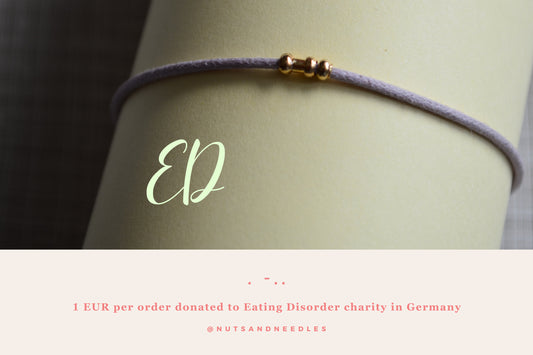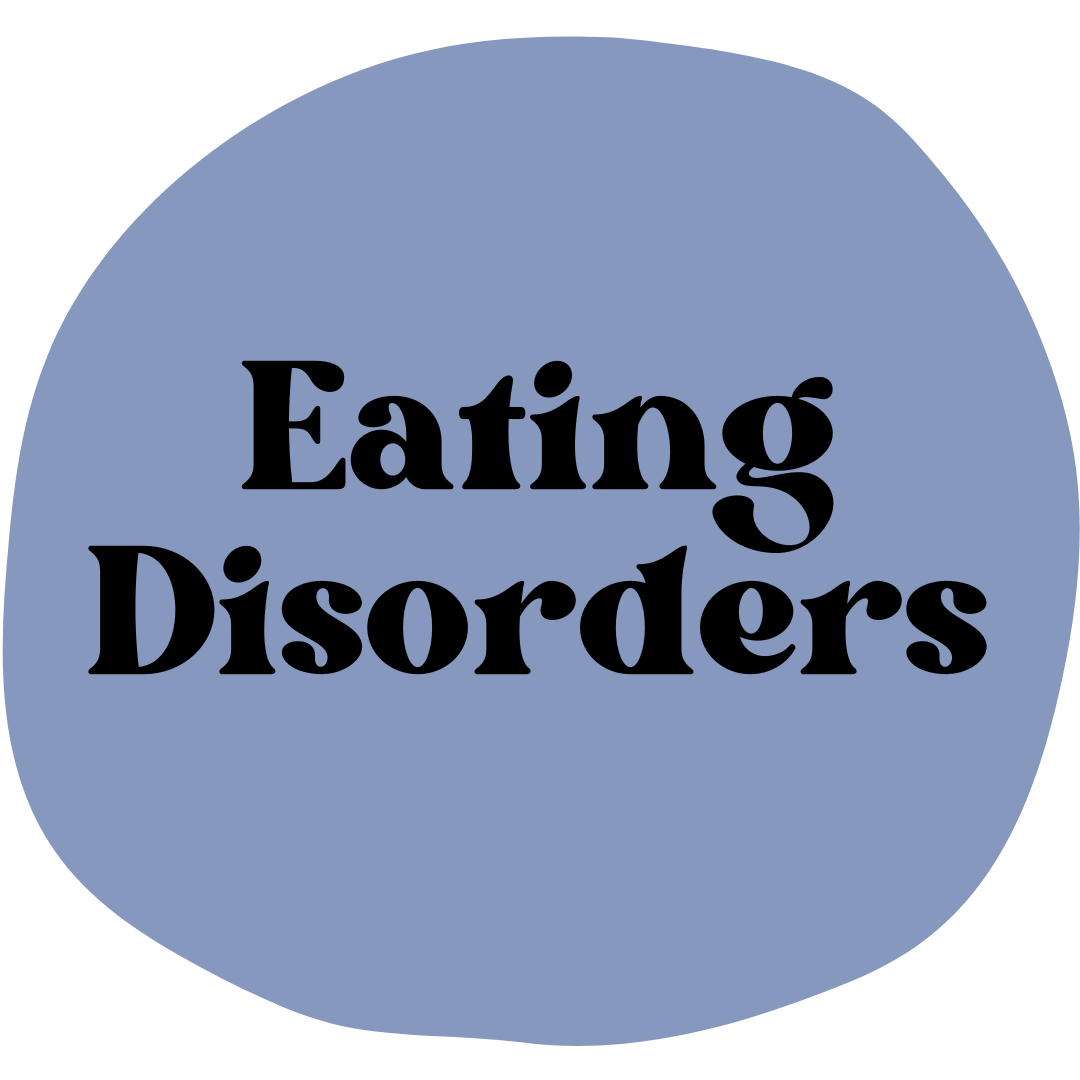written by Sarah Doleschal (nuts&needles)
Eating disorders are serious conditions that lead to distorted body image, harmful behaviors, and other mental illnesses. They are characterized by an unhealthy relationship with food and often involve an obsession with weight loss or control.
There are many different types of eating disorders: Anorexia Nervosa, Bulimia Nervosa, Binge Eating Disorder, Orthorexia Nervosa, and others.
Although each eating disorder has its own symptoms and characteristics, there are some similarities between them. Eating disorders are associated with low self-esteem, extreme fear of weight gain, and a distorted body image. They are often accompanied by other mental health problems, including depression and anxiety disorders.
People with eating disorders can have serious health problems, including weight loss or gain, electrolyte imbalances and heart problems, amenorrhea (absence of menstrual periods), osteoporosis (brittle bones), infertility, dental problems, and more.
Eating disorders can affect anyone at any age. They often begin in late adolescence or early adulthood, but can develop at any age. Eating disorders are more common in girls and women than in boys and men, but boys and men can develop them, too.
Magersucht (anorexia nervosa)
Anorexia is a serious mental illness that affects people of all ages, genders, and races. It is characterized by an unhealthy obsession with weight loss and body image. Anorexia is not just about being thin, but also about being in control. People with anorexia often have a distorted self-perception and think of themselves as fat, even if they are at a healthy weight or underweight. They may not be able to recognize how thin they are because they are used to seeing themselves at a lower weight. Anorexia can affect anyone - men and boys as well as women and girls. It's also more common than you might think: about 1% of American adults will suffer from anorexia at some point in their lives.
Bulimie (bulimia nervosa)
Bulimia is a serious disorder that affects millions of people worldwide. It is characterized by recurrent binge eating and purging tendencies. The disorder affects people of all ages, races and ethnicities, regardless of gender or socioeconomic status. It is estimated that up to 10% of young women are affected by the symptoms at some point in their lives. Bulimia nervosa involves binge eating, which is the consumption of large amounts of food within a short period of time, and then sufferers feel the need to get rid of the calories they have consumed. To compensate for the amounts consumed during the binge, purges (self-induced vomiting) or excessive exercise may occur. Some people also take laxatives or diuretics to lose weight after a binge eating episode.
Binge Eating Disorder
Binge eating disorder (BED) is an eating disorder that causes people to eat large amounts of food in a short period of time. It is often accompanied by feelings of shame and guilt, which makes it difficult to tell friends and family about the problems. Many people with BED also struggle with other mental health issues, such as depression or anxiety. Some people with BED use food as a way to cope with stress or negative feelings. If you think you may be struggling with binge eating disorder, it's important to talk to a doctor or therapist about how to get help.
Orthorexia nervosa
Orthorexia nervosa is a disorder characterized by an obsession with healthy food that often leads to malnutrition. The term "orthorexia" is made up of the Greek words for "right" ("ortho") and "habit" or "way of life" ("rexis").
People with orthorexia tend to have an unhealthy relationship with food that makes it difficult for them to eat normally, which can lead to serious health problems if left untreated.
Affected individuals may also suffer from other mental health conditions such as depression or anxiety, making it all the more important that they seek treatment as soon as possible.
What causes an eating disorder?
An eating disorder is a complex disease that doesn't just happen overnight.
It starts with a desire to control your body, which can be motivated by many things - even something as simple as wanting to look good in your new bathing suit. However, when this desire becomes an all-consuming desire, it can lead to an unhealthy relationship with food and your body.
You may end up eating less or more than usual, or obsessing over certain foods. You may feel guilty about what you eat or how much you exercise. Some people who suffer from an eating disorder also develop other mental health problems, such as depression or anxiety.
What are the challenges of those affected?
Eating disorders are a serious mental illness that affects all areas of your life.
You may be struggling with an eating disorder if you:
- Feel out of control when it comes to eating and drinking
- Have a fear of gaining weight, even if you are underweight
- Are preoccupied with food, calories, and dieting
- Limit the amount or type of food you eat
- binge eating when you are not hungry
- Use unhealthy methods to cope with stress (e.g., vomiting)
How can eating disorders be treated?
While there is no cure for eating disorders, they can be treated with therapy and medication. For example, people with anorexia may be prescribed antidepressants or anti-anxiety medications to manage their depression or anxiety. People with bulimia may be prescribed antidepressants and anti-nausea medications to help manage their depression or anxiety.
Therapy can also help people with eating disorders manage their emotions, teach them healthy ways to deal with stress, and give them tools to change their negative thinking patterns.
The first step is to find a therapist who specializes in eating disorders. He or she can help you develop a treatment plan that fits your needs, whether it's in-person or online therapy.
There are also different types of eating disorder treatment:
- Cognitive behavioral therapy (CBT) uses techniques such as guided imagery and relaxation exercises to help you change the way you think about food, weight and your body image.
- Dialectical-behavioral therapy (DBT) teaches mindfulness training and coping skills that help people with eating disorders better manage their feelings.
- Family-based therapy helps parents learn how to support their children with anorexia or bulimia by changing the way they communicate with them - for example, by focusing on the "what" instead of the "how much."
The next step is a thorough physical exam and lab tests. This is important because your doctor may detect other health problems such as thyroid problems or diabetes that could be the cause of your eating disorder. If these conditions are under control, you will feel better and have better results with your chosen treatment.
Finally, it is important to make sure that the medications your doctor prescribes do not interact with other medications or supplements you are taking for other conditions or symptoms.
DOs in dealing with those affected
What is helpful in dealing with eating disordered loved ones?
If you have a loved one who is struggling with an eating disorder, you may be asking yourself this question. We know how hard it is to watch someone you love get sick, but we also know there are ways you can help the person get better.
- The first thing you can do is to educate yourself about eating disorders and their causes. The more you know about the disorder, the more effective your support can be. For example, if your friend suffers from anorexia nervosa or bulimia nervosa, he or she will need professional help from a therapist or nutritionist who specializes in treating these disorders. If you know what kind of treatment he or she needs, you can help support him or her in recovery.
- If your loved one is not ready for treatment, you can help him/her find other ways to cope with stress or anxiety, such as exercise or meditation. You could also be a positive role model by showing them how to deal with life's challenges in a healthy way, rather than using food as an escape mechanism.
- Give up patience and understanding. Recovery from an eating disorder doesn't happen overnight - it takes time and effort, both on the part of the sufferer and their loved ones.
- Find ways to express your love for them in ways other than food. Show them how much they mean to you by taking time to talk about something other than food or weight loss (or lack thereof).
- Don't try to fix things for them; instead, let them know that you are there for them if they need help overcoming their food or body image issues.
DON'Ts in dealing with those affected
When someone you love is suffering from an eating disorder, it's often hard to know how to help. You want to help, but you don't want to make things worse.
Here are some ways NOT to help:
- Don't tell them they are too fat or too thin.
- Do not make comments about their appearance or weight.
- Don't try to force them into a treatment.
- Don't make comments about how they always eat the same thing or how often they go jogging.
- Don't keep asking them what's wrong.
- Don't ask them to eat more than they want.
- Don't pressure them to go on a diet with you.
- Don't insist on being the only person who cooks in the house.
Don't assume your loved one will get better on their own - even if they do, remember that recovery from an eating disorder is a lifelong process, and some people may need additional support in the early stages.





